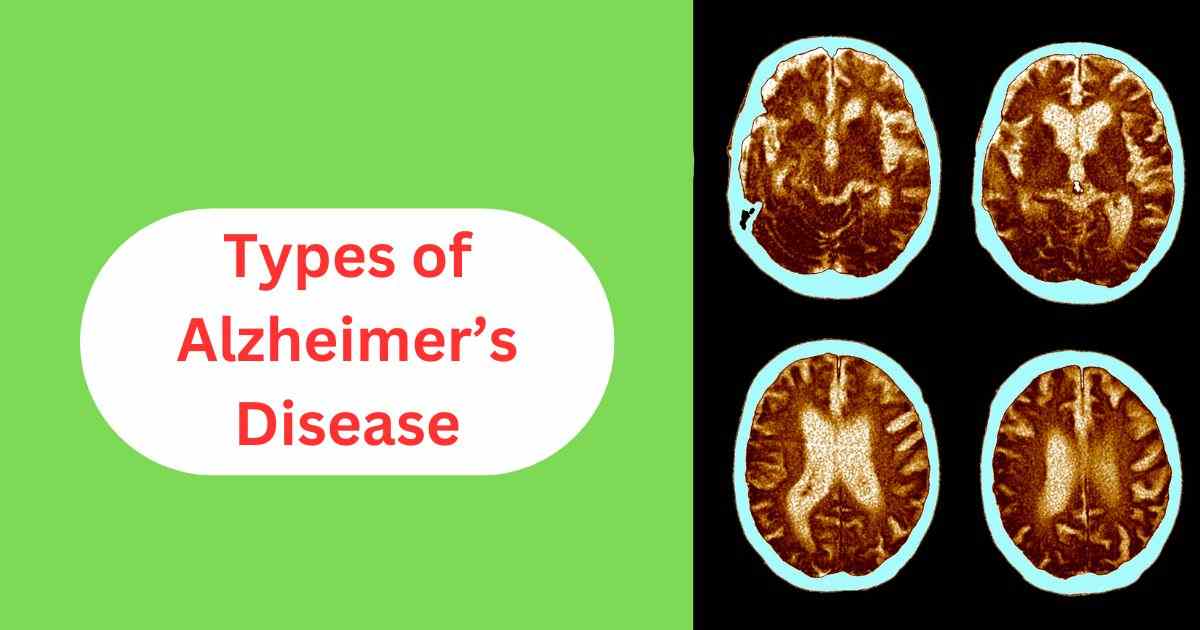Alzheimer’s disease, a progressive neurodegenerative disorder, manifests in various forms, each presenting unique challenges for patients, caregivers, and clinicians alike. Understanding the different types of Alzheimer’s is crucial for accurate diagnosis, personalized treatment, and effective management strategies. Here is our article about the symptoms and causes of Alzheimer’s disease. In this article, we explore the various types of Alzheimer’s disease, shedding light on their distinct characteristics and implications.
Types of Alzheimer’s Disease
There is no unanimous opinion among scientists with regard to the classification of Alzheimer’s disease. However, given below are the most accepted classification of Alzheimer’s disease
#1 Late-Onset Alzheimer’s Disease
Late-onset Alzheimer’s disease is the most common form of the condition, typically occurring after the age of 65. While advancing age is the most significant risk factor for late-onset Alzheimer’s, genetic factors, such as the presence of the APOE ε4 allele, also play a role in disease susceptibility. Late-onset Alzheimer’s progresses slowly over time, gradually impairing memory, cognition, and daily functioning. While there is no cure for late-onset Alzheimer’s, medications and supportive therapies can help manage symptoms and improve quality of life for affected individuals.
#2 Early-Onset Alzheimer’s Disease
Early-onset Alzheimer’s disease, also known as younger-onset Alzheimer’s, typically manifests before the age of 65, although symptoms can appear as early as one’s 30s or 40s. This form of Alzheimer’s accounts for a small percentage of cases but poses significant challenges due to its impact on individuals in the prime of their lives, including career, family, and financial responsibilities. Genetic factors, such as mutations in genes like APP, PSEN1, and PSEN2, are often implicated in early-onset Alzheimer’s, highlighting the importance of genetic testing and counseling for affected individuals and their families.
#3 Familial Alzheimer’s Disease (FAD)
Familial Alzheimer’s disease, a rare genetic form of the condition, is inherited in an autosomal dominant pattern, meaning that a mutation in a single gene passed down from one parent is sufficient to cause the disease. FAD typically manifests at a younger age than sporadic forms of Alzheimer’s and may progress more rapidly. Mutations in genes such as APP, PSEN1, and PSEN2 are associated with familial Alzheimer’s, highlighting the importance of genetic counseling and testing for affected families.
#4 Sporadic Alzheimer’s Disease
Sporadic Alzheimer’s disease accounts for the majority of cases and occurs in individuals with no known family history of the condition. While genetic factors, such as the APOE ε4 allele, may increase the risk of sporadic Alzheimer’s, environmental and lifestyle factors also play a significant role in disease development. Sporadic Alzheimer’s typically manifests later in life and progresses slowly over time, gradually impairing memory, cognition, and daily functioning.
#5 Early-Stage Alzheimer’s Disease
Early-Stage Alzheimer’s: In the early stages, individuals may experience mild memory lapses and cognitive difficulties, such as forgetting recent events or misplacing belongings. Despite these challenges, individuals can typically function independently with minimal assistance.
#6 Middle-Stage Alzheimer’s Disease
Middle-Stage Alzheimer’s: As the disease progresses to the middle stage, cognitive decline becomes more pronounced, affecting memory, language, judgment, and problem-solving abilities. Individuals may require increasing assistance with daily tasks, such as dressing, grooming, and meal preparation.
#7 Late-Stage Alzheimer’s Disease
Late-Stage Alzheimer’s: In the late stages, individuals experience severe cognitive and functional impairment, requiring round-the-clock care and assistance with all aspects of daily living. Communication becomes severely limited, and individuals may lose the ability to recognize loved ones or perform basic tasks independently.
If you need a memory supplement, Neurodrine is a natural and quality supplement.
Final Thoughts
Alzheimer’s disease presents in various forms, each with its unique characteristics, implications, and challenges. From early-onset and late-onset forms to familial and sporadic cases, understanding the different types of Alzheimer’s is essential for accurate diagnosis, personalized treatment, and effective management strategies. By raising awareness and fostering a deeper understanding of Alzheimer’s disease, we can better support affected individuals, their families, and caregivers on their journey through this complex and challenging condition.
For related reading, read our article about Alzheimer’s disease treatment.

